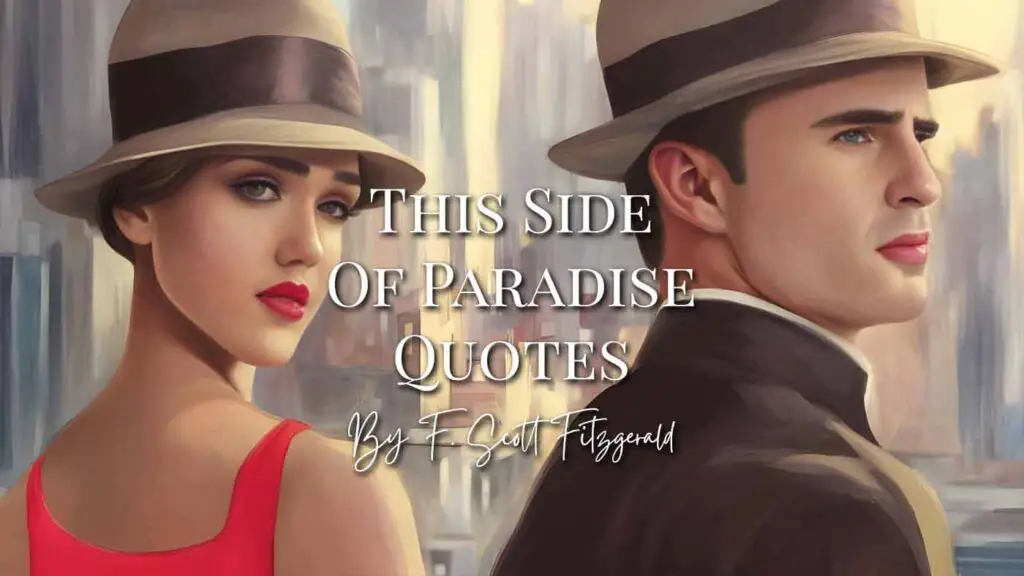Explore "This Side Of Paradise": Quotes, Analysis & More!
Is it possible for a single novel to perfectly encapsulate the spirit of an entire generation? "This Side of Paradise," F. Scott Fitzgerald's incandescent debut, not only attempts this feat but, arguably, achieves it, offering a dazzling, if often heartbreaking, portrait of the Jazz Age.
Published in 1920, "This Side of Paradise" arrived like a comet, igniting the literary world and instantly catapulting Fitzgerald to fame. The novel, a semi-autobiographical coming-of-age story, chronicled the life of Amory Blaine, a handsome and ambitious young man navigating the social and intellectual landscape of early 20th-century America. Fitzgerald, with his lyrical prose and keen eye for detail, captured the youthful exuberance, the moral ambiguities, and the underlying disillusionment that characterized the era.
Fitzgerald's work did more than just document the Roaring Twenties; it helped define them. He became a cultural icon, a symbol of the era's extravagance, its hedonism, and its ultimate fragility. "This Side of Paradise" provided a roadmap to the anxieties and aspirations of a generation grappling with the aftermath of World War I, the decline of traditional values, and the rise of a new, more permissive society.
- Discover Top Glute Training Machine Solutions Latest Insights
- Find Son Of The Morning Star Dvd Your Guide To The Film
The novel's success was immediate and transformative. The first printing sold out in a matter of days, a testament to the public's hunger for a story that reflected their own experiences and desires. This success provided Fitzgerald with the financial and social capital to pursue his own personal ambitions, including winning back Zelda Sayre, the woman he loved and would eventually marry, embarking on a relationship as tumultuous as it was legendary.
"This Side of Paradise" remains a cornerstone of American literature, admired for its stylistic innovation and its insightful portrayal of the human condition. It's a novel that continues to resonate with readers today, offering a window into a bygone era while also speaking to the timeless themes of youth, love, ambition, and the search for meaning.
| Full Name | Francis Scott Key Fitzgerald |
| Born | September 24, 1896, in St. Paul, Minnesota |
| Died | December 21, 1940, in Hollywood, California |
| Nationality | American |
| Education | Princeton University (attended, but did not graduate) |
| Notable Works | This Side of Paradise (1920), The Great Gatsby (1925), Tender Is the Night (1934) |
| Spouse | Zelda Sayre Fitzgerald (married 19201940) |
| Literary Movement | Jazz Age, Lost Generation |
| Known For | Capturing the essence of the Roaring Twenties, exploring themes of wealth, love, and social class, and his unique writing style. |
| Reference Website | Britannica: F. Scott Fitzgerald |
The novel's exploration of themes such as love and sexuality offered a radical perspective. The book depicts the American young people's lifestyle between the two world wars, a generation often characterized by its rejection of tradition and its embrace of a more liberated way of life. The freedom of expression that Fitzgerald brought to his work challenged the established norms of the time. The importance of the book is reflected in its lasting impact on American literature and culture.
- 53 Weeks 53 Days Conversions Calculations Insights
- Hoover Strong Refining Wholesale Jewelry Solutions Learn More
The narrative does not shy away from the complexities of youth, from the intoxicating thrill of romantic pursuit to the inevitable disappointments and heartbreaks that accompany the search for happiness. It delves into the evolving social dynamics of the era, examining the ways in which wealth, social status, and personal ambition shape individual lives.
"This Side of Paradise" offers many insights, which are not limited to just the plot. The book's impact extends to the social and cultural transformations of the time. In exploring the theme of love and sexuality, Fitzgerald portrays the changing attitudes of the generation. The novel's frank discussions about love and relationships offered a fresh perspective on a topic previously shrouded in restraint.
Fitzgerald's prose, as showcased throughout the novel, is both evocative and insightful, capable of capturing the essence of a fleeting moment or a complex emotion with remarkable precision. The book offers a new generation, shouting the old cries, learning the old creeds, through a revery of long days and nights. Here was a new generation, shouting the old cries, learning the old creeds, through a revery of long days and nights.
The novel showcases a generation dedicated more than the last to the fear of poverty and the worship of success. Many nights he lay there dreaming awake of secret cafes in Mont Marte, where ivory women delved in romantic mysteries with diplomats and soldiers of fortune, while orchestras played Hungarian waltzes and the air was thick and exotic with intrigue and moonlight and adventure.
"This Side of Paradise" stands as an essential piece of American literature, capturing the zeitgeist of the 1920s and showcasing Fitzgerald's emerging talent. The author's unique style, marked by its lyricism, its wit, and its capacity for poignant observation, helped define the literary landscape of the era. The book explores the complexities of youth, the pursuit of happiness, and the ever-changing landscape of American society.
The novel's impact on popular culture is undeniable, with its themes and characters continuing to resonate with readers across generations. The exploration of love, ambition, and the search for meaning makes it a timeless work. The author's debut novel is a vibrant portrait of a generation on the cusp of change.
Fitzgerald's writing continues to provide readers with a deeper understanding of the past, which in turn, allows for insights into the current events. The book also explores the societal shifts of the period, with particular attention to the changing roles of women and the evolving dynamics of relationships.
"This Side of Paradise" is also a treasure trove of quotable moments, providing readers with a glimpse into the author's wit and wisdom.
The novel's enduring popularity can be attributed to its ability to speak to the universal experiences of human life, which continues to fascinate readers of all ages. The quotes included in the novel represent Fitzgerald's insight into the human condition, particularly the struggles of youth and the search for fulfillment.
Fitzgerald's success with "This Side of Paradise" not only launched his literary career but also enabled him to marry Zelda Sayre. Their relationship, as documented in biographies and film, was as much a source of inspiration for his writing as it was a catalyst for personal turmoil. The couple's lives, intertwined with the novel's success, became a symbol of the Jazz Age.
The novel has been a source of inspiration for countless readers and writers. The book is also celebrated for its stylistic innovation, with Fitzgerald experimenting with narrative structure, point of view, and language. It's a testament to the power of literature to capture the essence of an era and the enduring appeal of human experience.
- Style Icons Black Actors With Beards Glasses See How They Do It
- Shop Billy Connolly Art Posters Prints More Discover Now

F. Scott Fitzgerald This Side of Paradise Love yourself quotes, Life

37 Best This Side of Paradise Quotes by F. Scott Fitzgerald Sevenov

37 Best This Side of Paradise Quotes by F. Scott Fitzgerald Sevenov